Latest EPA Research 2030 Reports
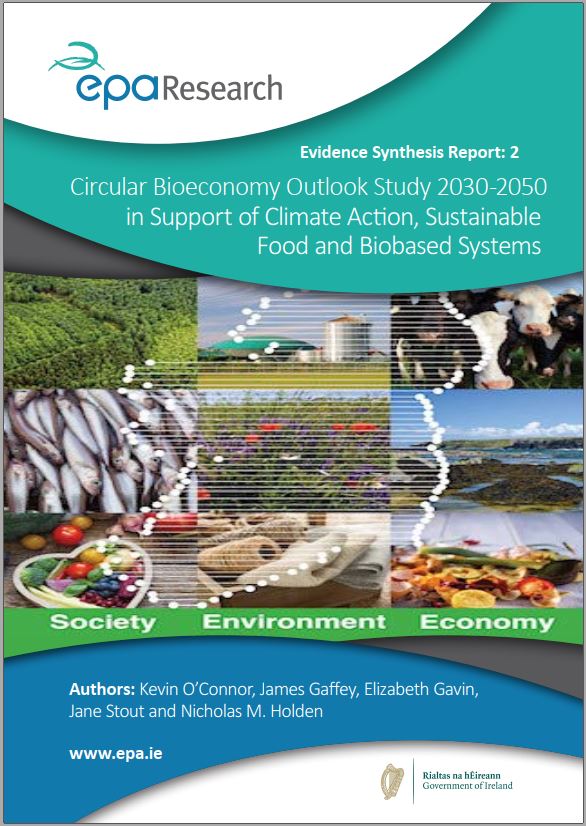
Evidence Synthesis Report 2: Circular Bioeconomy Outlook Study 2030–2050 in Support of Climate Action, Sustainable Food and Biobased Systems
Authors: Kevin O’Connor, James Gaffey, Elizabeth Gavin, Jane Stout and Nicholas M. Holden, February 2023
Year: 2023
This report provides an outlook for Ireland’s circular bioeconomy for the period 2030–2050, highlighting the potential to create economic, environmental and social opportunities for new biobased innovations.
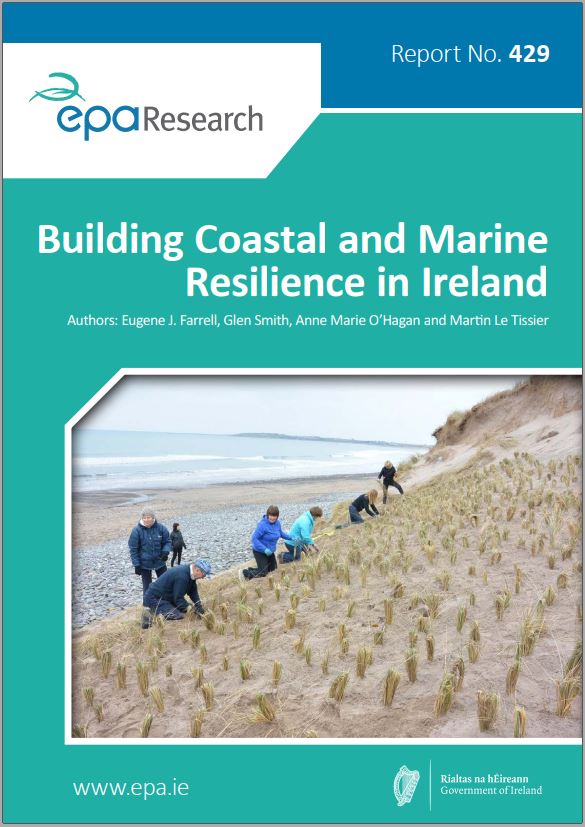
Research 429: Building Coastal and Marine Resilience in Ireland
Authors: Eugene J. Farrell, Glen Smith, Anne Marie O’Hagan and Martin Le Tissier, February 2023
Year: 2023
The identification and increased awareness of climate change risks to Ireland’s coastal communities highlights the importance of building national resilience across socio-ecological and economic systems. This research investigated barriers to the environmental and socio-economic resilience of two coastal communities: Maharees, County Kerry, and Youghal, County Cork.
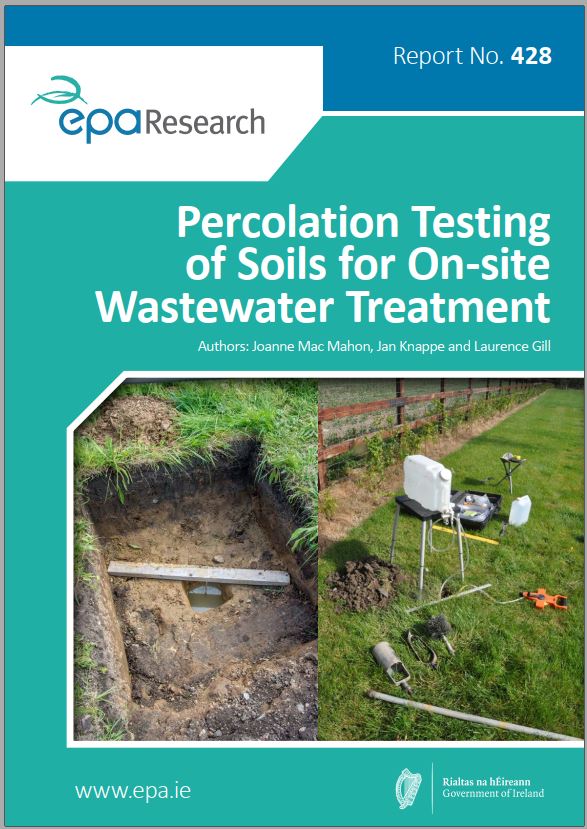
Research 428: Percolation Testing of Soils for On-site Wastewater Treatment
Authors: Joanne Mac Mahon, Jan Knappe and Laurence Gill, January 2023
Year: 2023
Estimation of soil permeability is a critical aspect of on-site wastewater treatment system design. The findings of this research identify a need to revise the currently available options in the Irish Code of Practice for estimating soil permeability for on-site wastewater system design. In this research, a correlation was developed between field saturated hydraulic conductivity (Kfs) and percolation time (T-values) across a full range of Irish soil texture data.
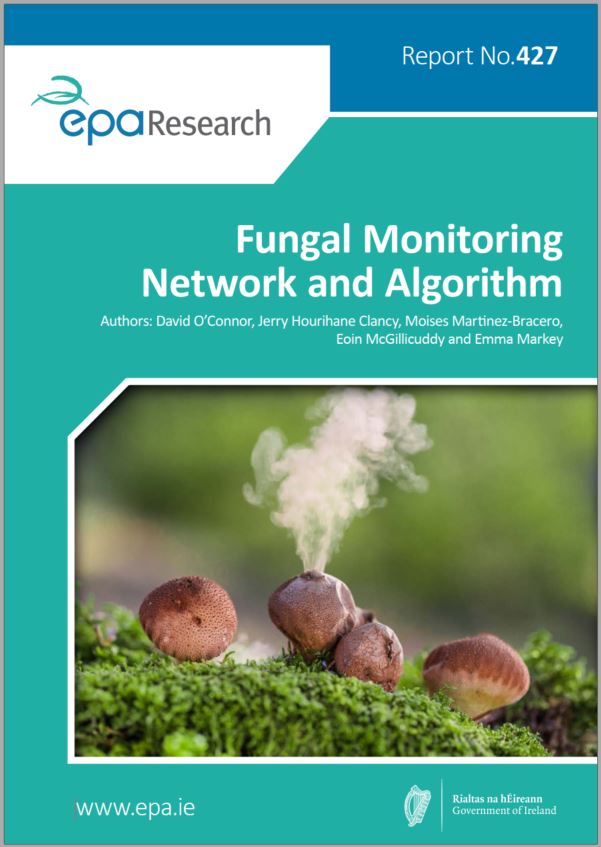
Research 427: Fungal Monitoring Network and Algorithm
Authors: David O’Connor, Jerry Hourihane Clancy, Moisés Martínez-Bracero, Eoin McGillicuddy and Emma Markey, December 2022
Year: 2022
Bioaerosols are biological particles in the air such as pollen, fungal spores, bacteria and viruses. While most are harmless, some can trigger adverse effects such as hay fever or respiratory diseases. The impacts of bioaerosols on the health of the Irish population and agriculture and the linkages to climate remain underexplored. This project seeks to address this problem by undertaking the required monitoring and by developing a forecast model.
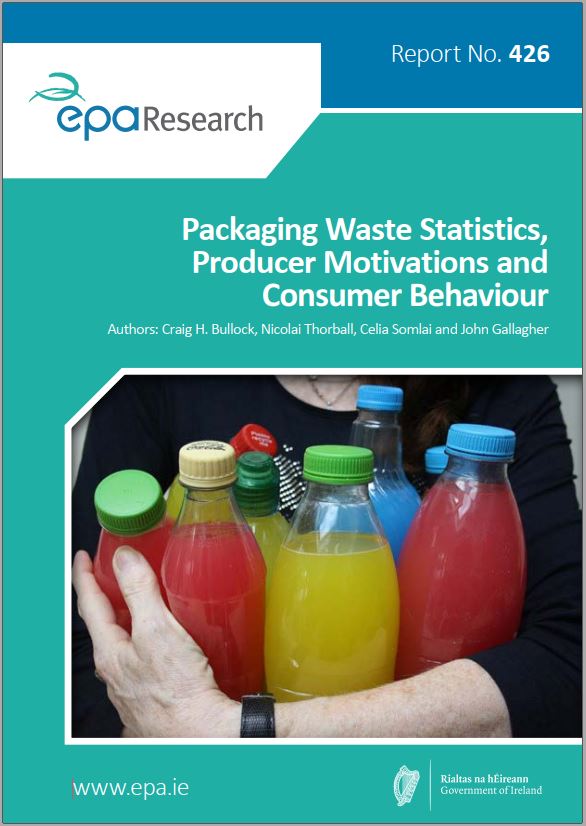
Research 426: Packaging Waste Statistics, Producer Motivations and Consumer Behaviour
Authors: Craig H. Bullock, Nicolai Thorball, Celia Somlai and John Gallagher, December 2022
Year: 2022
The production of plastic packaging for food and other products has increased substantially over the past 50 years. The ReWrapped project investigated why Ireland’s production of plastic packaging waste appears to be higher than that of other EU Member States. The project also undertook a survey of producers to help understand what drives their use of different types of plastic and the extent to which sustainability considerations influence their decision-making.
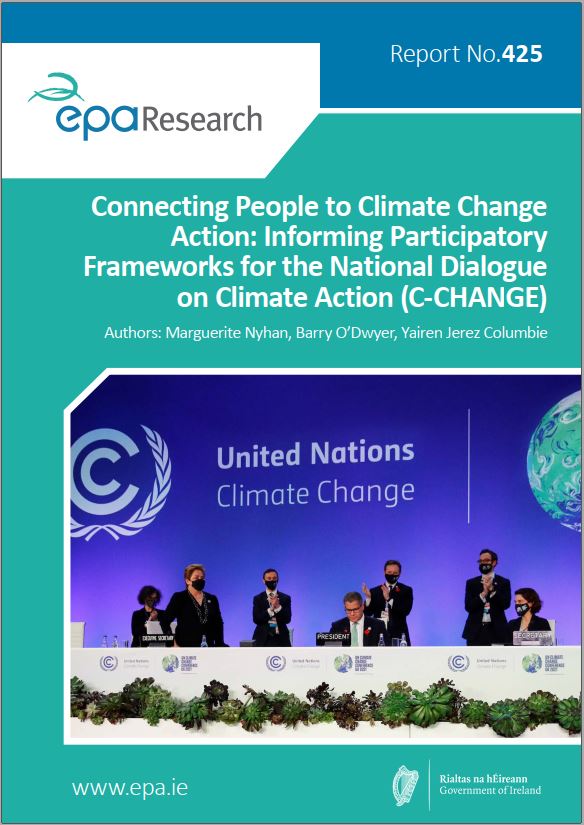
Research 425: Connecting People to Climate Change Action: Informing Participatory Frameworks for the National Dialogue on Climate Action (C-CHANGE)
Authors: Marguerite Nyhan, Barry O'Dwyer and Yairen Jerez Columbié, October 2022
Year: 2022
Ireland has committed to achieving a net-zero and climate-neutral economy by 2050. The C-CHANGE project is focused on developing solutions and provides guidance on facilitating stakeholders’ and citizens’ participation in environmental and climate dialogues and thus in climate action nationally and internationally. The research outputs provide clear and flexible guidelines that can be adapted to different contexts, sectors and audiences by practitioners, researchers and authorities.
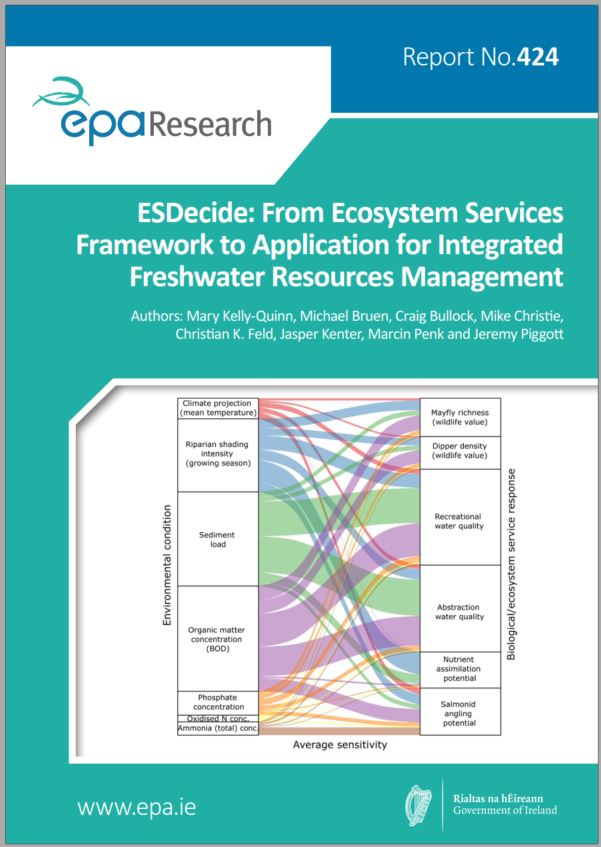
Research 424: ESDecide: From Ecosystem Services Framework to Application for Integrated Freshwater Resources Management
Authors: Mary Kelly-Quinn, Michael Bruen, Craig Bullock, Mike Christie, Christian K. Feld, Jasper Kenter, Marcin Penk and Jeremy Piggott, September 2022
Year: 2022
The ESDecide project set out to build on the outputs of the previous EPA-funded ESManage project by developing the tools and guidance needed to advance the incorporation of ecosystem services and the concept of “nature’s contribution to people” (NCP) into decision-making for the protection and management of freshwater resources and other related policy goals. The project developed the interactive decision support tool ProgRES, which helps river resource managers estimate the probability of changes in biological responses and the associated ecosystem services/NCP changes in environmental conditions.
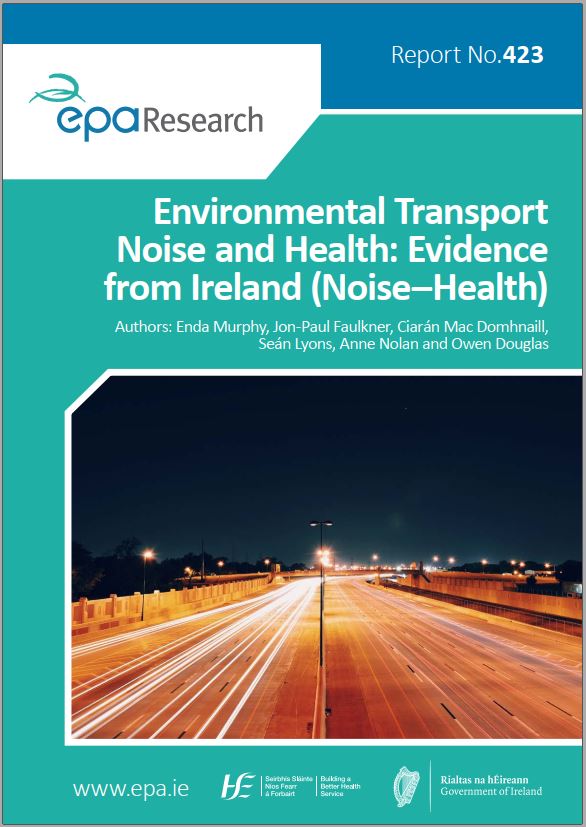
Research 423: Environmental Transport Noise and Health: Evidence from Ireland (Noise–Health)
Authors: Enda Murphy, Jon-Paul Faulkner, Ciarán Mac Domhnaill, Seán Lyons, Anne Nolan and Owen Douglas, September 2022
Year: 2022
Noise is found everywhere, particularly in urban areas, and is part of daily living and activity. However, noise can be a serious risk to public health and wellbeing. This report outlines key policy and practice recommendations for managing environmental noise in Ireland. It also details how “noise–health” considerations can be better incorporated into Irish policy.
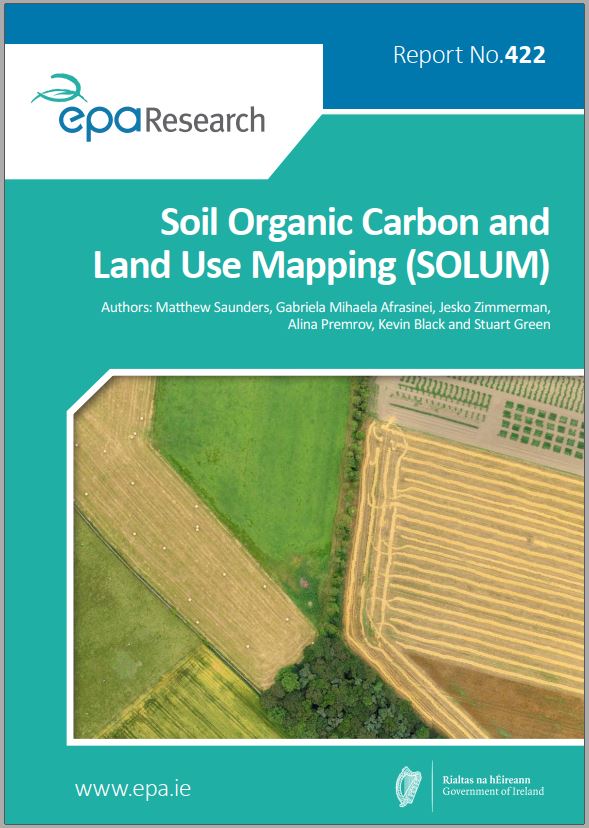
Research 422: Soil Organic Carbon and Land Use Mapping (SOLUM)
Authors: Matthew Saunders, Gabriela Mihaela Afrasinei, Jesko Zimmerman, Alina Premrov, Kevin Black and Stuart Green, September 2022
Year: 2022
Soils contain more than twice the amount of carbon held in the atmosphere, but globally approximately 1600 million tonnes of carbon are lost from the soil each year due to cultivation and land use. This research highlights how large geospatial datasets can provide an excellent source of land use information and can detect land use change events at both national and regional scales. The rule-based land use and soil inventory coupled with the soil cluster approach developed in this work could be implemented in current national land use mapping activities to enhance our ability to assess the impacts of land use and land use change on soil carbon stocks.
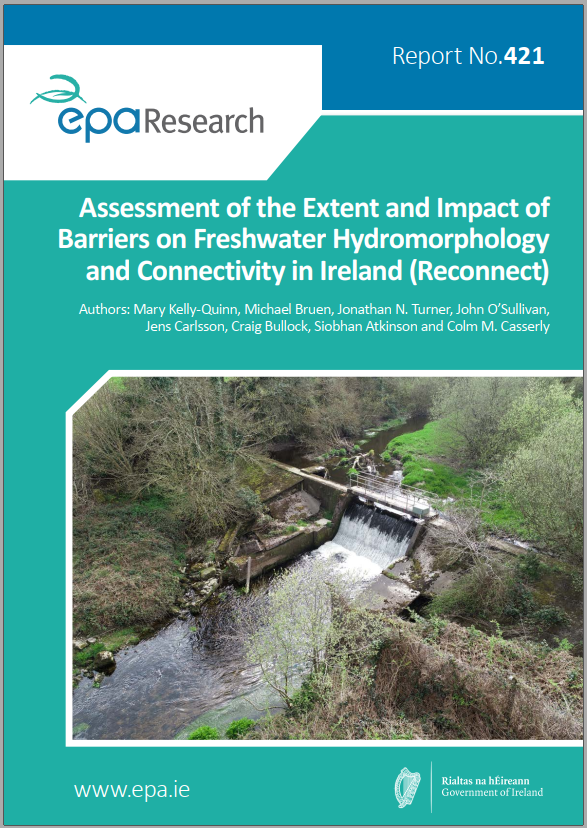
Research 421: Assessment of the Extent and Impact of Barriers on Freshwater Hydromorphology and Connectivity in Ireland (Reconnect)
Authors: Mary Kelly-Quinn, Michael Bruen, Jonathan N. Turner, John O’Sullivan, Jens Carlsson, Craig Bullock, Siobhan Atkinson and Colm M. Casserly, September 2022
Year: 2022
The Reconnect project advanced knowledge on the impact of low-head barriers on connectivity in Irish rivers in terms of sediment dynamics and ecology (fish, macroinvertebrates and macrophytes) through studies undertaken from 2016 to 2020 in four core study areas on the Duag, Dalligan and Burren rivers and Browns Beck Brook and at 35 other locations across 12 river/stream systems. The project also developed a methodology for prioritising barriers for modification or removal to improve hydromorphology and connectivity.
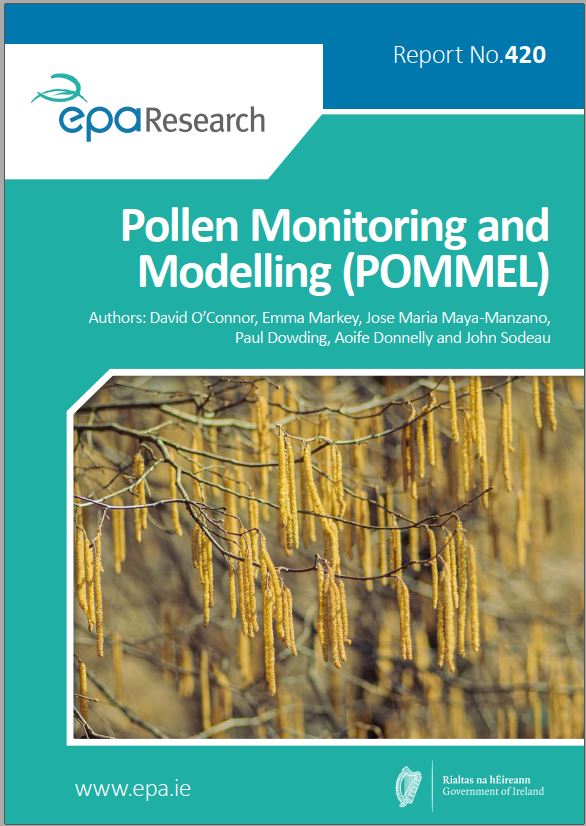
Research 420: Pollen Monitoring and Modelling (POMMEL)
Authors: David O’Connor, Emma Markey, Jose Maria Maya-Manzano, Paul Dowding, Aoife Donnelly and John Sodeau, August 2022
Year: 2022
A reliable pollen forecast and monitoring system is a valuable tool to help allergy sufferers avoid unnecessary exposure to allergenic pollen and to optimise drug treatments by allergists. Ireland does not have a monitoring system in place and the forecast currently used is provided by the University of Worcester (UK). This project seeks to address this by undertaking the required monitoring and developing a forecast model.
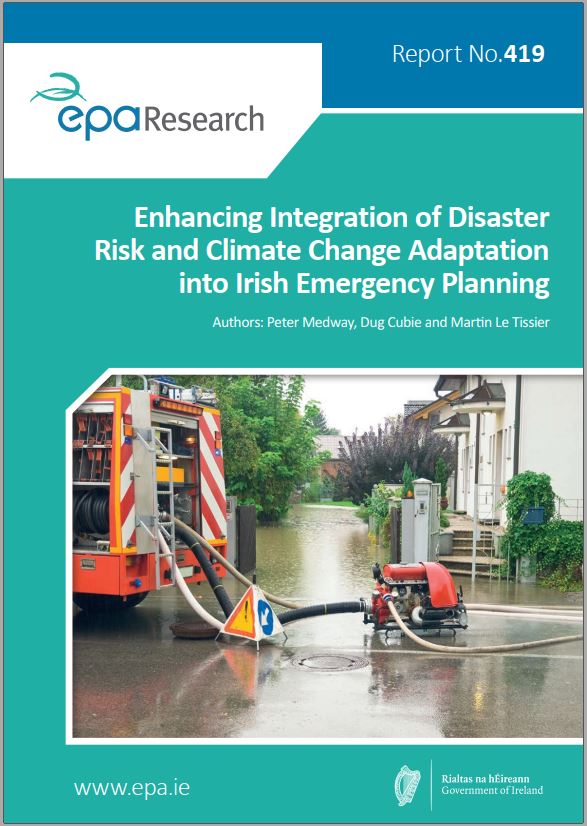
Research 419: Enhancing Integration of Disaster Risk and Climate Change Adaptation into Irish Emergency Planning
Authors: Peter Medway, Dug Cubie and Martin Le Tissier, August 2022
Year: 2022
Climate research tells us that extreme weather events will become more frequent and severe. Climate change adaptation (CCA) focuses on the probable chronic long-term impacts likely to occur across multiple sectors. In contrast, emergency planning and disaster risk reduction (DRR) primarily aims to address acute short-term impacts. The project identifies how existing approaches to disaster risk reduction, disaster risk management (DRM) and CCA in Ireland are juxtaposed and concludes that identifying ways to promote coordination and align incentives, priorities and planning processes will facilitate a more holistic and comprehensive approach to DRM at all levels of government.
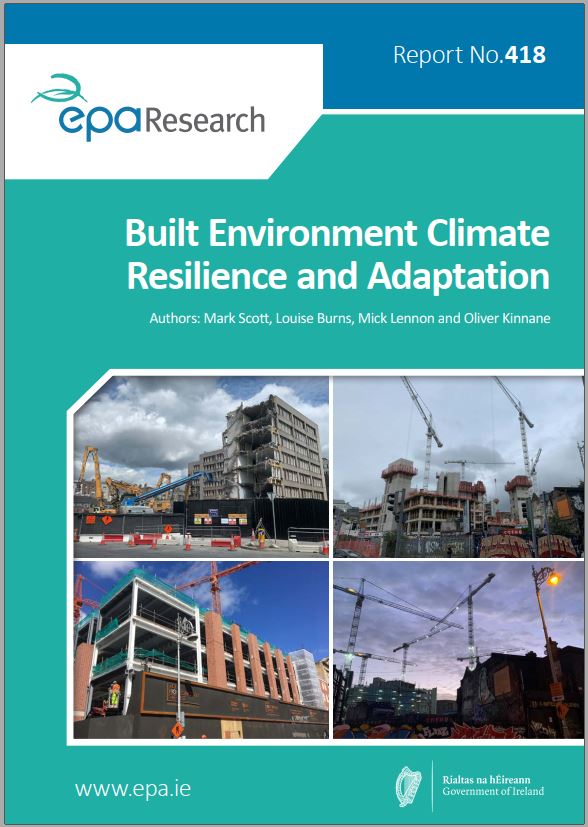
Research 418: Built Environment Climate Resilience and Adaptation
Authors: Mark Scott, Louise Burns, Mick Lennon and Oliver Kinnane, August 2022
Year: 2022
Climate change risks present a clear challenge for Ireland’s built environment. Adaptation is the critical second pillar of climate action alongside mitigation. This needs an urgent whole-of-government and whole-of-society approach. There is significant scope for increasing policy coherency towards adaptation through the planning system, building control, building regulation performance requirements, industry standards and building design specifications.
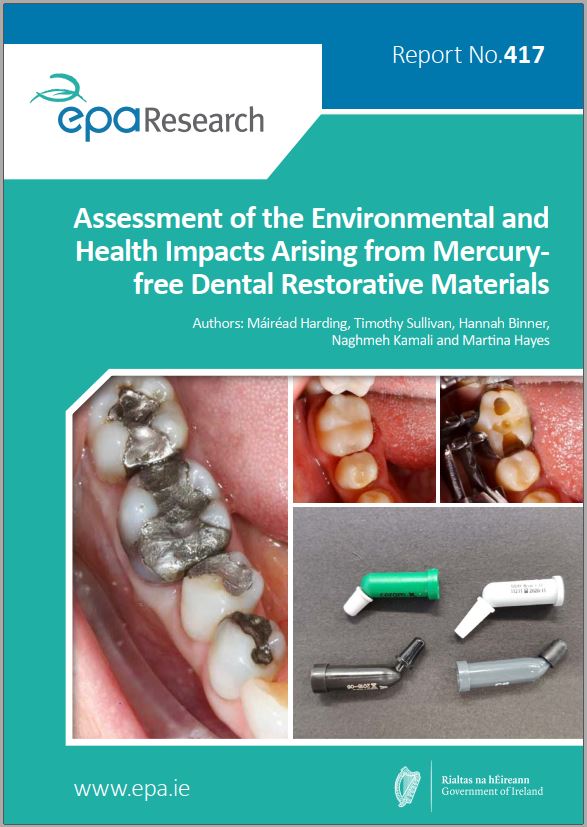
Research 417: Assessment of the Environmental and Health Impacts Arising from Mercury-free Dental Restorative Materials
Authors: Máiréad Harding, Timothy Sullivan, Hannah Binner, Naghmeh Kamali and Martina Hayes, July 2022
Year: 2022
The United Nations Minamata Convention on Mercury is an international regulatory framework that aims to protect human health and the global environment from the harmful effects of mercury. This research identified that very little literature exists on the environmental and health impacts of mercury-free dental restorative materials. It identified small particles from the mercury-free dental restorative materials in dental wastewater (DWW) and says it is essential to consider enhanced capture of small particles from DWW as a priority.
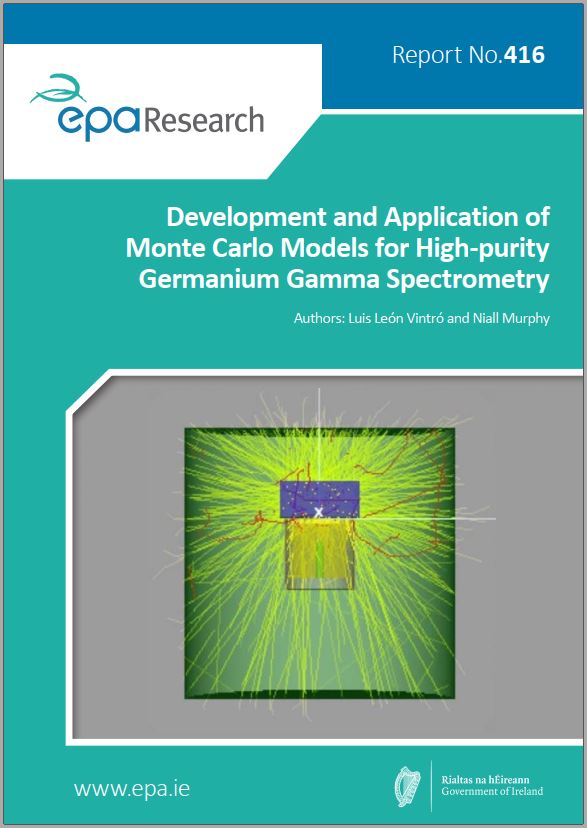
Research 416: Development and Application of Monte Carlo Models for High-purity Germanium Gamma Spectrometry
Authors: Luis León Vintró and Niall Murphy, July 2022
Year: 2022
The aim of this research project was to develop and implement suitable Monte Carlo calibration methods for the assay of natural and artificial radionuclides using HPGe gamma spectrometers. A software application was developed as part of this project. The application makes use of a set of nominal input parameters describing an HPGe detector, together with experimentally determined full-energy peak efficiencies for a range of radionuclides in a variety of counting geometries, to produce an optimised model of the detector by applying suitable optimisation algorithms without any further user intervention.
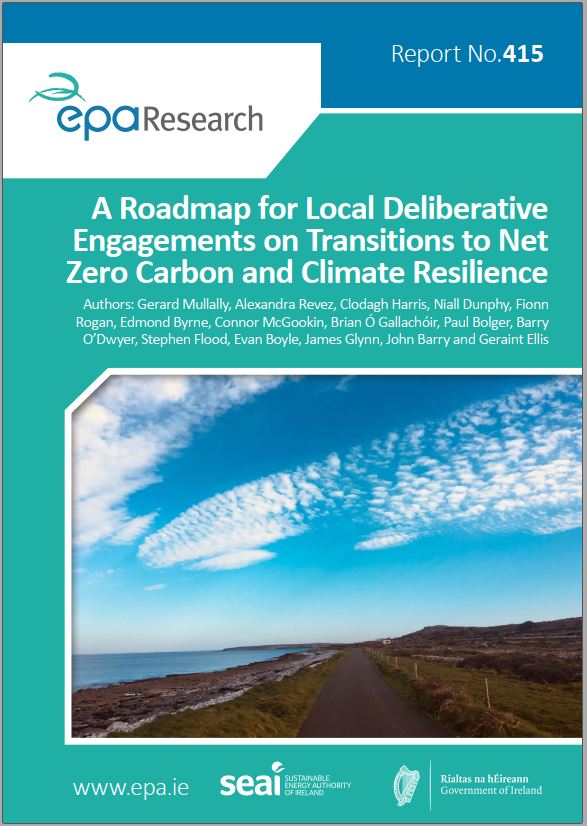
Research 415: A Roadmap for Local Deliberative Engagements on Transitions to Net Zero Carbon and Climate Resilience
Authors: Gerard Mullally, Alexandra Revez, Clodagh Harris, Niall Dunphy, Fionn Rogan, Edmond Byrne, Connor McGookin, Brian Ó Gallachóir, Paul Bolger, Barry O’Dwyer, Stephen Flood, Evan Boyle, James Glynn, John Barry and Geraint Ellis , July 2022
Year: 2022
Ireland faces considerable challenges in transitioning to a net-zero carbon and climate resilient future. This research focused on the challenge of engaging citizens and communities in climate action while also recognising that new and novel approaches are required to enable the transition to climate resilience. The co-creation of the Deliberative Futures Toolkit together with local, scientific and policy communities, provides a resource that can be used by communities and policymakers.
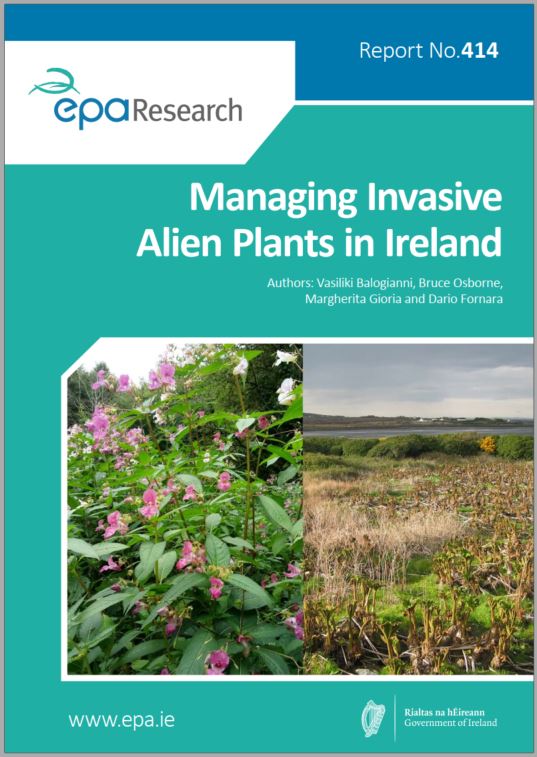
Research 414: Managing Invasive Alien Plants in Ireland
Authors: Vasiliki Balogianni, Bruce Osborne, Margherita Gioria and Dario Fornara, July 2022
Year: 2022
The presence of invasive alien plant species across Ireland and Europe has increased significantly in the past few decades. The impacts of these invasions vary but they can lead to major modifications in ecosystem functioning. This research project has broadened our understanding of the ecological traits, strategies and impacts of invasive species. This information can be used in the management of invasive plants and help to inform legislation that might need to be introduced or strengthened.
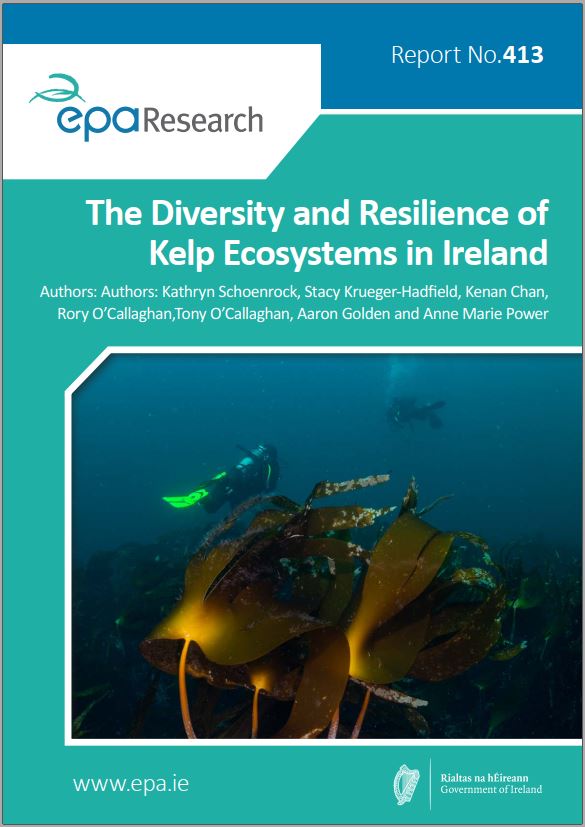
Research 413: The Diversity and Resilience of Kelp Ecosystems in Ireland
Authors: Kathryn Schoenrock, Stacy Krueger-Hadfield, Kenan Chan, Rory O’Callaghan, Tony O’Callaghan, Aaron Golden and Anne Marie Power, July 2022
Year: 2022
In Ireland, Kelp forests can be found along rocky shorelines and dominates rocky substrata along the Irish coastline (approximately 3010 km out of the 7524 km of national shoreline). The report makes recommendations concerning monitoring and preserving kelp ecosystems nationwide. A range of resilience metrics was assessed for subtidal kelp forests in Ireland to better understand how to monitor, manage and simply understand these systems and their potential responses to climate shifts in nearshore ecosystems.
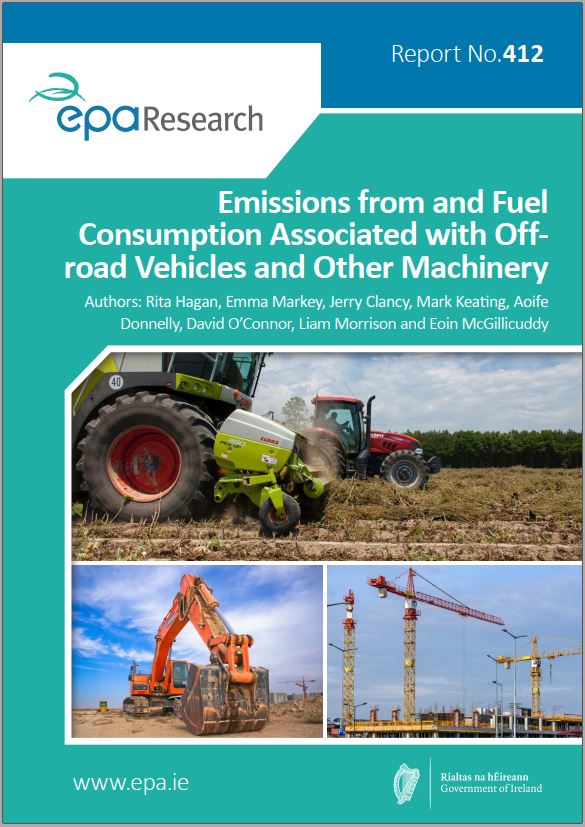
Research 412: Emissions from and Fuel Consumption Associated with Off-road Vehicles and Other Machinery
Authors: Rita Hagan, Emma Markey, Jerry Clancy, Mark Keating, Aoife Donnelly, David O’Connor, Liam Morrison and Eoin McGillicuddy, July 2022
Year: 2022
Non-road mobile machinery (NRMM) is a large category that until recently had not been widely researched in terms of its contribution of exhaust emissions to overall air pollution. The emissions from NRMM contribute significantly to air pollution. To lower emissions from NRMM and improve air quality, it is recommended that more data are collected from sectors such as rail, construction, and aviation, and from Transport Infrastructure Ireland. This research used the bottom-up approach of contacting NRMM owners and data holders to request data about their NRMM fleet and its fuel use.
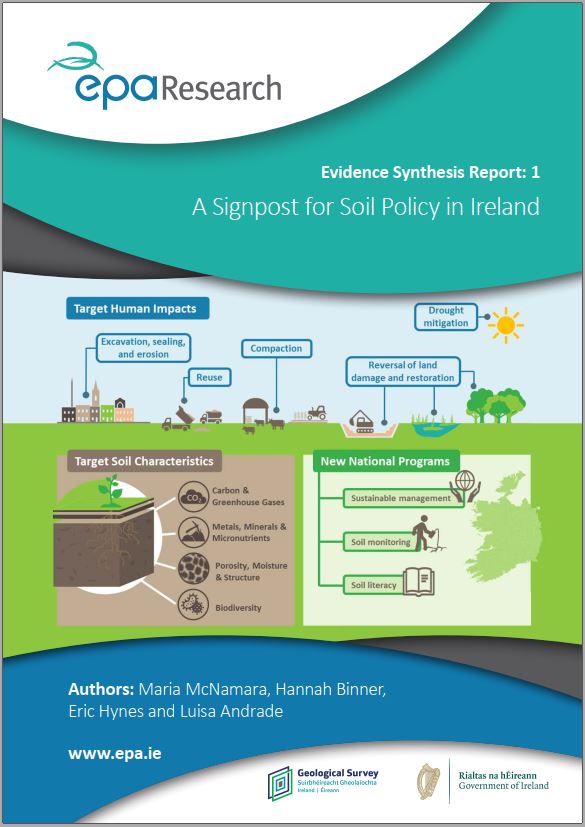
Evidence Synthesis Report 1: A Signpost for Soil Policy in Ireland
Authors: Maria McNamara, Hannah Binner, Eric Hynes and Luisa Andrade, June 2022
Year: 2022
This study aimed to generate an accessible evidence base to support the development of new policy on soil and to enable Ireland to meet its commitments to both national and EU soil strategies.